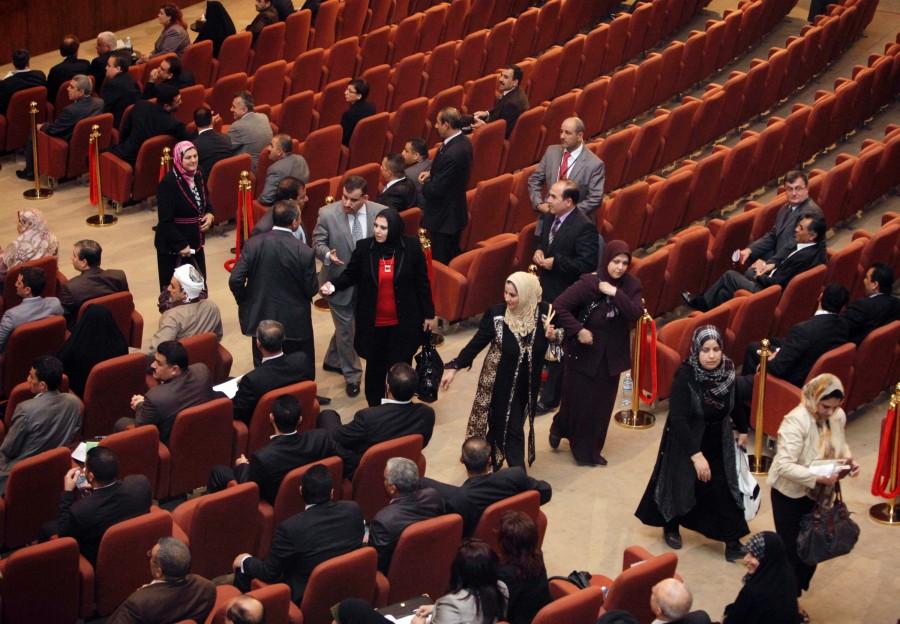BAGHDAD (AP) — The leaders of Iraq’s main political blocs plan to meet face-to-face for the first time since March elections, amid signs they are close to breaking the eight-month political deadlock that has stalled the formation of a new government.
The two men vying for prime minister — incumbent Nouri al-Maliki and his rival Ayad Allawi — both plan to attend Monday’s meeting, officials from their respective parties said.
If the meeting of deeply divided blocs goes forward, it would mark a rare sign of progress toward resolving months of political bickering, although such developments have fallen apart in the past.
“We have almost reached common ground on establishing a partnership,” said Abdul-Karim al-Samarraie, a Sunni lawmaker with Allawi’s Iraqiya bloc, a Sunni-backed coalition that is challenging the Shiite prime minister for power.
The leader of the Kurdish negotiating delegation, Najim al-Din Karim, called the meeting an “important step,” but warned that there are still sticking points in the negotiations that need to be resolved.
Kurdish President Massoud Barzani, who has successfully pushed for the summit to be held in Irbil in the Kurdish-controlled north, will attend. Several officials said representatives of the fourth bloc, a Shiite alliance backed by Iran and called the Supreme Islamic Iraqi Council, would take part in the meeting, although the group could not be reached for comment.
The meeting would mark the first time the leaders from the four major blocs have all met face-to-face to discuss the political impasse that has gripped the country since the March 7 polls.
Allawi’s Sunni-backed Iraqiya coalition won 91 seats in the election — two more than al-Maliki’s State of Law. But neither bloc secured an outright majority, which has led to a period to intense political negotiations as both groups try to cobble together enough support to head a new government.
Recently, political momentum has swung in al-Maliki’s direction. The prime minister got a big boost in late September when he joined forces with followers of anti-American cleric Muqtada al-Sadr. The Sadrists are archrivals of the prime minister, and previously had appeared to staunchly oppose al-Maliki keeping his job.
On Sunday, the small Sunni Iraqi Centrist Alliance, which has ten seats, said it would support al-Maliki as well for a second term. A Sunni lawmaker from the alliance, Rasheed al-Azawi, said the decision was designed “to add momentum to the negotiations so that we can help end the nearly eight-month old crisis.”
The prolonged political stalemate has been a source of concern both at home and abroad.
President Barack Obama said Sunday during a trip to India that the U.S. and Iraqi people are frustrated with the lack of progress on forming a new government.
“The government is taking way too long to get formed,” he said.
As the politicians have bickered, insurgents have continued to carry out deadly strikes. Last week, nearly 150 people died in two separate incidents in Baghdad — the siege of a church and a series of attacks targeting Shiites — as Sunni-led militants try to incite sectarian violence during the political vacuum.
Al-Maliki is still adamant that he keep the prime minister’s post, said al-Dabbagh, the government spokesman. But Iraqiya officials have balked at a second al-Maliki term.
Officials close to the negotiations say Iraqiya has been pushing for limits to al-Maliki’s power if he were to stay on as prime minister. They spoke on condition of anonymity due to the sensitivity of the talks.
One idea on the table is the creation of an independent position called the National Council for the Strategic Policies, which would go to someone in Iraqiya if al-Maliki were to be prime minister. But Iraqiya officials are pushing for the position to have some sort of concrete authority, while al-Maliki’s supporters prefer it to be solely consultative.
The meeting comes as Turkish foreign minister, Ahmet Davutoglu, was in Iraq to push lawmakers to break the impasse. Davutoglu told reporters in Irbil Sunday that he was discussing and consulting with the country’s major political players on how to break the logjam. He met later Sunday with al-Maliki.
Iraqi lawmakers are to meet Thursday for only their second parliament session since the election.
__
Associated Press writers Sinan Salaheddin and Barbara Surk contributed to this report from Baghdad and Yahya Barzanji from Irbil.
Copyright 2010 The Associated Press.







